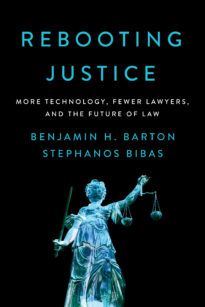In Rebooting Justice: More Technology, Fewer Lawyers, and The Future of Law, Benjamin H. Barton and Stephanos Bibas put forth a case for how new technologies can disrupt America’s tangled law sector. In his review for The New York Times’ DealBook, Jonathan A. Knee explains the crisis of the status quo in our legal system, how it prevents everyday Americans from accessing justice, and what Rebooting Justice says we can do about it.
An excerpt of the review is available below:
“State courts have simply asserted that they have “inherent authority” over the administration of the legal system. Under this view, rules governing lawyers, as “officers of the court,” and the practice of law in theory are “not subject to legislative reversal or encroachment.” “Rebooting Justice” painstakingly documents how this clearly self-interested legal doctrine has been abused by courts in an unholy alliance with bar associations to shield lawyers from competition at the expense of the public.
This regime has spawned the twin pillars of the current crisis. On the one hand, providing any legal services typically requires attendance at a law school whose accreditation requirements — often entailing an expensive library, burdensome faculty guidelines, three years of course requirements and more — impose a prodigious entry barrier and an equally prodigious debt burden on graduates. On the other hand, once admitted, members benefit from a secretive disciplinary process that almost never results in penalties or expulsion, combined with aggressive policing of the “unauthorized practice of law” should any nonlawyer try to assist a litigant unable to afford the real deal.
One of the biggest surprises of this enlightening and well-written book is that its authors are highly regarded law professors, with extensive experience not only as academics but as practitioners. The surprise is not primarily that it is against their self-interest as established members of the club. Rather it is because the most powerful innovations documented in “Rebooting Justice” appear to have sprung from the creative minds of nonlawyers.
For example, the dispute resolution software developed internally at eBay — and subsequently licensed as a “fairness engine” applied to a wide range of alternative domestic and international settings — was the brainchild of a former Peace Corps volunteer, Colin Rule. More broadly, a startling number of the entrepreneurs who are reshaping the legal landscape for the better have come from outside the profession. For example, Law360, which changed the way legal news is collected and reported, was founded by two graduate students who were neither lawyers nor American.
Since so many of the innovations that have had the effect of actually improving things have come from nonlawyers, the legal establishment’s continued protection of the status quo — all justified under the spurious guise of “consumer protection” — is all the more indefensible.
Mr. Barton and Mr. Bibas have used their deep knowledge of the culture, history and institutions involved to identify which specific functions can be at least as effectively performed by laymen or technology. They also demonstrate how corresponding adjustments to the roles still played by full-fledged lawyers — most notably, judges — should enable the system to generate more justice with fewer lawyers.”
Read the full review here.
